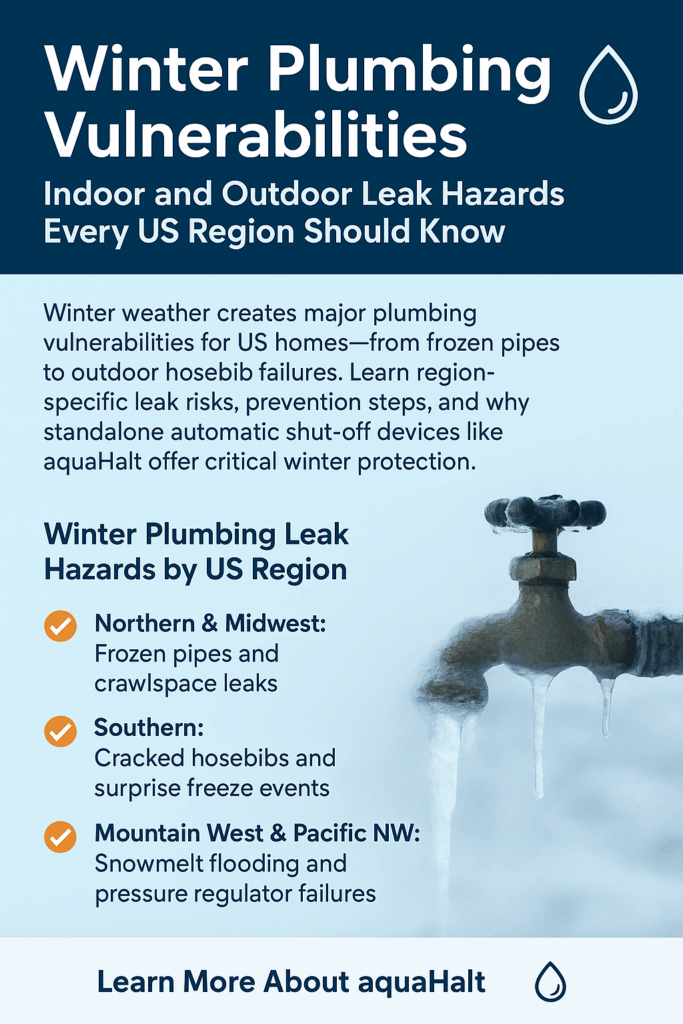
As temperatures drop, plumbing systems across the country come under stress in ways most homeowners never notice — until a leak becomes a flood.
According to the Insurance Information Institute (2024), winter freeze-related plumbing failures are among the top three causes of water damage claims, costing US homeowners over $11,000 per incident on average. And in regions with extended cold snaps, the financial toll is even higher.
The challenge is that many winter-related leaks are:
Slow and silent
Hidden behind walls, outdoors, or in crawlspaces
Completely preventable with the right preparation
From frozen interior pipes up north to split hosebibs in warmer states, winter reveals vulnerabilities that otherwise stay dormant all year.
This guide walks you through:
✔ Region-specific winter plumbing risks
✔ Indoor and outdoor leak hazards
✔ Practical prevention steps
✔ How automatic shutoff devices like aquaHalt protect your home — even during power and internet outages
Winter doesn’t strike every region the same way. Here’s what homeowners across the country should prepare for.
Typical states: MN, WI, MI, IL, OH, PA, NY, VT, ND, SD, MA, ME
Extended freezes and sudden temperature drops make these areas especially vulnerable to:
High-risk locations include:
Uninsulated basements
Exterior-facing walls
Garages
Attics
When water freezes, it expands — and the pressure can rupture copper, PEX, and PVC lines with ease.
In winter, furnace-attached humidifiers often drip due to:
Cracked valves
Loose fittings
Clogged drain tubes
These leaks often go unnoticed for weeks.
Add insulation sleeves to exposed pipes
Leave cabinet doors open during severe cold snaps
Disconnect and drain humidifier lines during maintenance
Place aquaHalt units under sinks, toilets, and fridge lines for automatic shutoff protection
Why aquaHalt matters here:
If a pipe bursts at 2 AM in a crawlspace or basement, aquaHalt detects the leak instantly and shuts off water at the source — no Wi-Fi, no power, no app needed.
Typical states: TX, LA, GA, SC, AL, MS, OK, AZ
Southern homes are built for heat, not cold. That’s why unexpected freezes — such as the Texas 2021 event — cause massive water damage.
Common vulnerabilities:
Non-insulated hosebibs
Exposed PVC irrigation lines
Outdoor laundry hookups
A single overnight freeze can split a spigot or crack a line behind the wall.
Many homes place water heaters, softeners, or washing machines in outdoor closets — making them highly vulnerable.
Install hosebib covers
Insulate outdoor utility closets
Drain irrigation systems
Place aquaHalt units in exterior laundry closets and washing machine hookups
Why aquaHalt matters here:
Outdoor utility closets freeze faster than indoor rooms. aquaHalt’s automatic shutoff prevents flooding even if you’re away.
Typical states: CO, UT, WY, ID, WA, OR, MT
This region’s temperature swings between freezing nights and warmer days create constant plumbing stress.
Pipes expand at night, contract during the day — a cycle that weakens plumbing over time.
Cold snaps can crack regulator valves, triggering:
Leaks at the main
Appliance hose bursts
Sudden surges in pressure
Basements and crawlspaces often take on water during late-winter melts.
Insulate all exterior piping
Test pressure regulators annually
Keep sump pumps clear
Add aquaHalt sensors to basements and under sinks
Even homes in warm climates experience winter-related plumbing issues:
Cold weather stiffens supply lines, increasing the chance of cracks.
Small drips go unnoticed more easily during winter months.
Winter strain increases the risk of tank failure and valve leaks.
Drain tubes work harder in winter — and clog more often.
Prevention:
Install aquaHalt units at high-risk indoor locations: kitchens, bathrooms, laundry rooms, and near water heaters.
These should be checked immediately:
Outdoor hosebibs
Irrigation/sprinkler systems
Pool equipment
Exterior laundry hookups
Water softener sheds
RV/auxiliary connections
Even a minor winter leak can freeze, expand, and rupture — causing severe structural damage.
Kitchen sinks
Bathroom sinks
Behind toilets
Laundry machines
Water heaters
Furnace humidifiers
Hosebibs
Exterior utility closets
Crawlspace entry points
Softener sheds
Why aquaHalt is ideal for winter:
If the internet drops, the power goes out, or a freeze shuts down your router — aquaHalt continues working, sounding a local alarm and shutting off water instantly.
Winter plumbing failures are expensive, disruptive, and often invisible until the damage is extensive. But with the right preparation — and the right protection — they’re far easier to prevent than repair.
Insulate exposed pipes
Cover and drain hosebibs
Inspect appliance supply lines
Check furnace humidifier tubing
Install automatic shutoff devices like aquaHalt
If you want a leak protection system that works even during:
✔ Power outages
✔ Internet outages
✔ Router failures
✔ Severe freeze events
Then aquaHalt offers the reliability you need — fully standalone, fully automatic, with a local alarm and immediate shutoff.